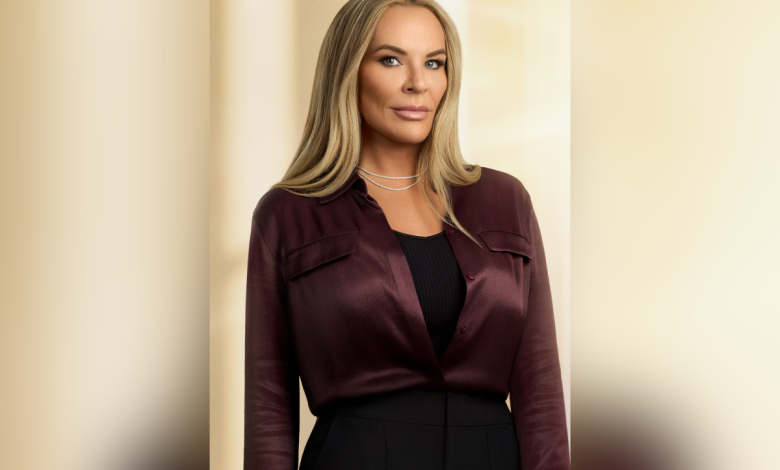Heather Gay Defined Mormonism for Pop Culture—Now She’s Exposing It

For decades, the public face of The Church of Jesus Christ of Latter-day Saints, widely known as the Mormon church, included the perkiness of the Osmond family and missionaries on bicycles, portraying an unwavering, wholesome image. Nowadays, the most visible and defining portrayals of the faith are coming from women on reality TV shows like Bravo’s The Real Housewives of Salt Lake City and Hulu’s The Secret Lives of Mormon Wives.
First among these voices is Heather Gay of RHOSLC. A member of the original cast, Gay has shared her story of leaving the church on the reality series and in her bestselling memoir Bad Mormon, and recently came out with the docuseries Surviving Mormonism on Peacock.
“I think women are doing it [appearing on reality TV] because it’s the only outlet we have to have identity or power in a very patriarchal, hierarchical structure,” Gay said in an interview for Newsweek’s The Parting Shot podcast. This structure is rooted in the fact that only men can hold the priesthood, which in the church is the divine authority to act in God’s name. They govern all leadership and ecclesiastical roles. “Mormon men are like little kings of their own kingdoms, so they don’t want to define it, or they don’t wanna look under the bed covers because it works great for them,” Gay added. Newsweek contacted the Church of Jesus Christ of Latter-day Saints for comment.
But as the main characters on these TV shows, women have demonstrated the many complexities of Mormon life, past and present. “I still feel like I’m Mormon every time I wake up. My personality was being a Mormon, so I’m trying to still extrapolate it out every day,” said Gay.
Gay is seen discovering a new and complex life on RHOSLC by drinking, living life as a single mom or talking to family members about their faith crisis. The Secret Lives of Mormon Wives chronicles the lives of younger Mormon women, seen dancing at clubs, providing financially for their families and navigating lives after divorces.
“I think that we are talking about subjects and things that people have been struggling with for a long time. Garments, drinking, having sex before you’re married, I think these are things that [Mormons] have been doing but having a lot of shame around them,” SLOMW’s Layla Taylor said. According to Latter-day practices, garments are sacred underclothing worn only by endowed members to serve as a reminder of temple covenants, while drinking alcohol is forbidden by the Word of Wisdom (which also prohibits coffee and tea) and sex before marriage violates the law of chastity. “Just being able to be open about these topics is making people feel less alone,” Taylor said.
These more varied depictions have moved the public’s perception of Mormonism into a more uninhibited territory. For many, Gay included, a post-Mormon reality is more about uncertainty.
The “Perfect” Performers
It may seem paradoxical that a faith built on modesty would thrive under the unflinching gaze of reality television cameras. But, Gay said, the two are not so different. “Mormonism is such a performative faith. It’s like showing up, looking a certain way, behaving a certain way. It’s also not about how you actually feel, it’s how you present to the world. That type of performative being baked into ourselves makes us perfect for reality TV.”
The Secret Lives of Mormon Wives took TV by storm in 2024, with three seasons in just over a year. It follows Mormon moms who catapulted to internet fame as an influencer group known as “MomTok.” From “soft swinging,” where they’d kiss each other’s husbands, to drinking and emotional affairs, much of what is seen on the SLOMW is seemingly antithetical to the religion. But, like Gay, even those who have left the church feel pressure to keep up appearances.
Taylor, who is still a member of the church, but isn’t practicing, said the church doesn’t need to get rid of its rules but needs to be modernized, so people can “feel like your sins aren’t too sinful to be a part of the church. I think that’s a lot of the problem with the church, that you do something wrong and can’t be open about it or you’ll be outcasted.”
For Gay, leaving the church wasn’t a simple lights-out moment. For the millions who have done the same, leaving Mormonism is an existential amputation. “It’s behavior. The church is your behavior,” Gay said, adding that the habit of being Mormon is very hard to break. “It’s not just your worship on Sunday, it’s your behavior every day of the week.”
In a faith where men hold all priesthood authority, reality TV has become an unexpected loophole for female dissent.
The young moms on SLOMW would have traditionally been expected to stay home and care for the house. But they’re the breadwinners in their relationships, and as women break generational gender norms, their husbands have to as well.
“Gender roles have been a very taboo topic because something that we’re traditionally taught as Mormons was that as women, our role is just to take care of kids and the man’s role is to provide,” SLOMW’s Jen Affleck said.
Viewers watched her and husband Zac Affleck struggle to navigate life in an unconventional Mormon marriage. Zac Affleck, who comes from generations of Mormons, initially pushed his wife to leave MomTok to support his dream of going to medical school across the country. But, as she got more opportunities, he seemed to come around to the idea of a more balanced relationship, even talking about being a stay-at-home dad while his wife appeared on Dancing With the Stars.
“At the end of the day, you have to do what’s right and best for you, and just because you were traditionally taught one way doesn’t mean another way is wrong,” she said. “Don’t let the traditional cultural pressures stop you from doing that.”
Televised Testimony
This public deconstruction comes at a price. Gay admitted feeling “survivor’s guilt,” acknowledging the “privilege” of a Bravo platform that most ex-Mormons lack. “I had all of the privileges, something bigger came along that allowed me to let go of that rope. Most Mormons that leave, their life isn’t [immeasurably better]. Your life is in many, many ways worse, but they have enough integrity to not live a double life and to not pretend just for the safety of belonging.”
And sometimes this break with the norms of the church allows them to raise questions over how certain people are treated. Mayci Neeley is one of the few women on SLOMW who is an active member of the LDS church and has spoken out about its stance on LGBTQ+ issues, attending a Pride parade on the show.
Taylor, meanwhile, said she was “naive and young” when she joined the church as a teenager, and that it’s been difficult to reconcile her faith with a scripture in the Book of Mormon historically interpreted to mean “Black skin is a curse”—something Taylor, who is biracial, wasn’t aware of when she converted. Citing this and other beliefs, the church’s policy prior to 1978 barred Black men from holding the priesthood and denied Black people access to integral religious ceremonies.
In 1978, a revelation known as “Official Declaration 2” ended this ban, allowing all “worthy male members” to receive the priesthood. A 2013 essay from the church titled “Race and the Priesthood” disavowed the theories that the ban was based on divine disfavor or a “curse.” “I understand the time those were written,” Taylor said. “However, for me, while on my own personal journey of embracing my Black identity, I chose to not stay active in a church that at one point had that in writing,” she said. “Though I am grateful for the impact of the positive parts of the church in my life at one point when I needed the hope and emotional support, personally I can’t be a part of something I don’t morally align with.”
Ultimately, the women defining Mormonism in pop culture are doing more than just making good television. They are holding a testimony, bearing witness to the experiences the church has historically silenced. In the process, they’re showing the multifaceted examples of Mormonism that just might force the church to modernize.
“If you are the true church on the face of the Earth, you should be strong enough to hear people that had bad experiences within that church,” Gay said of why she feels the church should listen to people like her sharing their experience with the faith. “If your humanity can’t step over that line, you need to question your humanity.”





